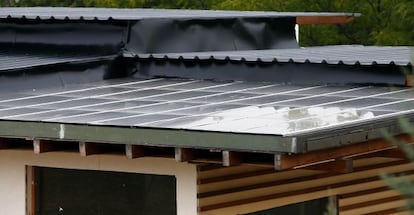Government to tax consumers who store their own renewable energy
Amounts due will discourage use of new devices such as the Tesla Powerwall battery Only off-grid consumers will be able to use batteries without being penalized

The Spanish government is planning to tax homes that produce their own energy through solar power and store some of it using batteries.
A draft decree prepared by the Industry, Energy and Tourism Ministry establishes a new fee to discourage the use of batteries or other storage systems by people who produce electricity, with solar or photovoltaic panels for instance, and who are connected to the national power grid.
Only off-grid consumers may use batteries without being charged
Under the new rules, these self-reliant consumers will not be able to use products such as the Powerwall battery recently launched by American automotive and energy-storage company Tesla, and will additionally be penalized for the storage systems that come included with the latest generation of solar panels.
Only off-grid consumers who have their own, completely independent energy-production systems will be able to use batteries without being penalized for it. Modern storage devices typically have an autonomy of two hours or so, making it difficult to be entirely self-reliant.
The new fee will not affect systems without storage, which work only for instantaneous consumption.
The tax will depend on the wattage that each consumer is getting from their energy provider. Prices will range between €8.90 and €15.30 per kilowatt (kW) for wattage of less than 15 kW connected to low-voltage services. This amount should be high enough to act as a deterrent, said Jorge Morales de Labra, an energy regulation expert, in statements made to the news agency Europa Press.
The Spanish government’s attitude is in contrast to other countries, such as Germany, which is encouraging the use of solar panels with batteries.
To further discourage self-production, the draft legislation also makes it clear that any energy surplus that individual self-producers feed back into the grid will not result in any monetary benefits. Businesses who do so (and who are high voltage customers) will, however, be allowed to turn a profit on their surplus.
Government funding cuts
In 2010, the Popular Party government of Prime Minister Mariano Rajoy raised the ire of international investors when it made cuts to subsidies for renewables as part of a review of its energy policies. The emirate of Abu Dhabi, for example, took action in 2011 to sue Spain over its reduction of premiums for solar thermal energy (STE) production. An earlier suit by 14 photovoltaic renewable energy producers, who complained that the Spanish government had unfairly changed the rules of the game, was rejected by the Supreme Court, which ruled that the cuts did not infringe the legal security of investment and were justified by the need to trim the tariff deficit (the difference between what utilities claim it costs to produce electricity and what they may charge customers).
Tu suscripción se está usando en otro dispositivo
¿Quieres añadir otro usuario a tu suscripción?
Si continúas leyendo en este dispositivo, no se podrá leer en el otro.
FlechaTu suscripción se está usando en otro dispositivo y solo puedes acceder a EL PAÍS desde un dispositivo a la vez.
Si quieres compartir tu cuenta, cambia tu suscripción a la modalidad Premium, así podrás añadir otro usuario. Cada uno accederá con su propia cuenta de email, lo que os permitirá personalizar vuestra experiencia en EL PAÍS.
¿Tienes una suscripción de empresa? Accede aquí para contratar más cuentas.
En el caso de no saber quién está usando tu cuenta, te recomendamos cambiar tu contraseña aquí.
Si decides continuar compartiendo tu cuenta, este mensaje se mostrará en tu dispositivo y en el de la otra persona que está usando tu cuenta de forma indefinida, afectando a tu experiencia de lectura. Puedes consultar aquí los términos y condiciones de la suscripción digital.








































